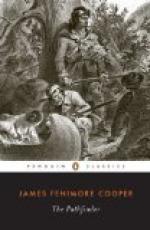“Ay, I understand the language of the riptyles, and can get along with it if there’s occasion,” returned the literal and truth-telling guide; “but it’s neither a tongue nor a tribe to my taste. Wherever you find the Mingo blood, in my opinion, Master Flinty-heart, you find a knave. Well, I’ve seen you often, though it was in battle; and I must say it was always in the van. You must know most of our bullets by sight?”
“Nevvair, sair, your own; une balle from your honorable hand be sairtaine deat’. You kill my best warrior on some island.”
“That may be, that may be; though I daresay, if the truth was known, they would turn out to be great rascals. No offence to you, Master Flinty-heart, but you keep desperate evil company.”
“Yes, sair,” returned the Frenchman, who, bent on saying that which was courteous himself, and comprehending with difficulty, was disposed to think he received a compliment, “you too good. But un brave always comme ca. What that mean? ha! what that jeune homme do?”
The hand and eye of Captain Sanglier directed the look of Pathfinder to the opposite side of the fire, where Jasper, just at that moment, had been rudely seized by two of the soldiers, who were binding his arms under the direction of Muir.
“What does that mean, indeed?” cried the guide, stepping forward and shoving the two subordinates away with a power of muscle that would not be denied. “Who has the heart to do this to Jasper Eau-douce? And who has the boldness to do it before my eyes?”
“It is by my orders, Pathfinder,” answered the Quartermaster, “and I command it on my own responsibility. Ye’ll no’ tak’ on yourself to dispute the legality of orders given by one who bears the king’s commission to the king’s soldiers?”
“I’d dispute the king’s words, if they came from the king’s own mouth, did he say that Jasper desarves this. Has not the lad just saved all our scalps, taken us from defeat, and given us victory? No, no, Lieutenant; if this is the first use that you make of your authority, I, for one, will not respect it.”
“This savors a little of insubordination,” answered Muir; “but we can bear much from Pathfinder. It is true this Jasper has seemed to serve us in this affair, but we ought not to overlook past transactions. Did not Major Duncan himself denounce him to Sergeant Dunham before we left the post? Have we not seen sufficient with our own eyes to make sure of having been betrayed? And is it not natural, and almost necessary, to believe that this young man has been the traitor? Ah, Pathfinder! Ye’ll no’ be making yourself a great statesman or a great captain if you put too much faith in appearances. Lord bless me! Lord bless me! If I do not believe, could the truth be come at, as you often say yourself, Pathfinder, that hypocrisy is a more common vice than even envy, and that’s the bane of human nature.”




